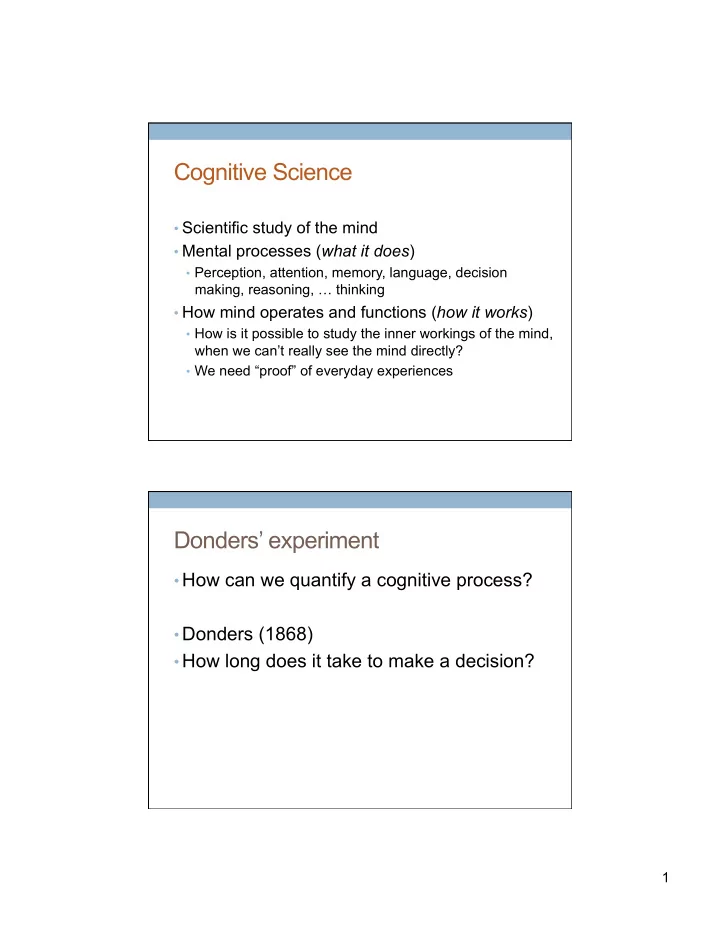

Cognitive Science • Scientific study of the mind • Mental processes ( what it does ) • Perception, attention, memory, language, decision making, reasoning, … thinking • How mind operates and functions ( how it works ) • How is it possible to study the inner workings of the mind, when we can’t really see the mind directly? • We need “proof” of everyday experiences Donders’ experiment • How can we quantify a cognitive process? • Donders (1868) • How long does it take to make a decision? 1
Hit the table when the dot appears! Hit the table with the same hand as location of dot when it appears! 2
Hit the table with the same hand as location of dot when it appears! Trial 1 Hit the table with the same hand as location of dot when it appears! Trial 2 3
Hit the table with the same hand as location of dot when it appears! Trial 3 Donders’ Experiment • How long does it take to make a decision? • Simple reaction time (RT) • Amount of time to perceive light and send signal to press button (or hit table!) • Choice RT • Amount of time to perceive light, make a decision, and send signal to press button • Choice RT – Simple RT = decision time • Too fast to measure directly, but can be inferred 4
How to study the mind • History of Psychology • Introspection to Behaviorism (Skinner) to “cognitive revolution” • First cognitive psychology textbook in 1967 • Information-processing approach • Metaphor: mind = computer • Determine sequence of mental operations How to study the mind • Flow diagrams and “models” • e.g. Broadbent’s (1958) “filter model of attention” • Allows for new and unique hypotheses • Big questions: • Can we create artificial intelligence? • What are the limits to human cognitive performance? • Studying the Brain • Cognitive Neuroscience 5
Cognitive Neuroscience • How can understanding the brain help us to understand cognition? • http://www.ted.com/talks/ vilayanur_ramachandran_on_your_mind.html • Capgras Delusion: • What cognitive functions are influenced? • What does it tell us about the function of the brain in cognition? Psychology of Magic • What cognitive functions are involved in magic? • http://gocognitive.net/video/alym-amlani-psychology-and- magic 6
For each topic we examine … • Introduction • What are the research questions? • Method • What did the Ss do? • How did the researchers find a way to measure the ‘hidden process’? • Results • What are the findings? • What is the support for the findings? • Discussion • What are the conclusions? • What is the next research question? Syllabus http://webs.wofford.edu/steinmetzkr/Teaching/Courses.html Goals. 1) Knowledge base for major findings and theories of cognitive psychology. 2) Understand and apply research design, analysis and interpretation. 3) Develop critical thinking skills. 4) Apply the findings from the field of cognitive psychology to real-world situations. 5) Improve APA style writing and presentation skills. 7
How to study more effectively (p 187-189) • Elaborate • Think about the meaning of the information that you are learning • Relate to what you already know • Associate: link information together • Generate and test yourself • Active involvement with the information • Come up with your own questions and then answer them • Organize • Create (generate!) outlines to form a framework to connect information (elaboration!) • Chunking: group information together • Spread it out • Use “distributed” practice (with breaks) instead of “massed” practice (aka cramming) • Sleep – to allow for memory consolidation (p16) • Match learning and testing conditions • Study same place as test OR study in many different locations • Avoid “illusions of learning” • “Don’t mistake ease and familiarity with knowing” (in preface of textbook) 8
Recommend
More recommend